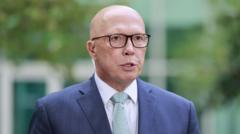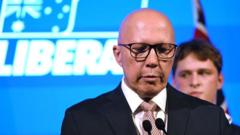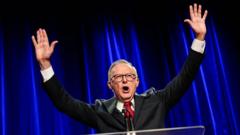Peter Dutton, leader of Australia’s opposition Liberal-National Coalition, has officially abandoned his contentious election proposal to eliminate work-from-home options for public sector employees, recognizing widespread disapproval.
Dutton Reverses Course on Work-from-Home Policy Ahead of Election

Dutton Reverses Course on Work-from-Home Policy Ahead of Election
Australia's opposition leader retracts controversial plan impacting public servants after public backlash.
In a hastily arranged press conference on Monday, Dutton admitted that his party “made a mistake” in proposing to end flexible work arrangements, initially framed as part of a broader strategy to enhance efficiency within the public sector. The criticism was vehement, particularly from the incumbent Labor government, which argued that such a policy would disproportionately hit women and working families.
“We got it wrong and we have apologised for it,” Dutton conceded. He clarified that the original policy aimed only at public service employees in Canberra but accused the Labor party of misleading the public and running a “smear campaign.”
Jane Hume, the shadow finance minister, reinforced that the coalition would no longer advocate for an end to flexible work, stating they had heard constituents’ concerns about work-life balance.
The Coalition has faced scrutiny regarding its larger proposal to reduce the public service workforce by 41,000 jobs, originally implying possible forced redundancies as part of their cost-saving measures. However, Hume noted that layoffs were not part of their plan, which would instead rely on a hiring freeze and natural attrition over five years.
Contradicting Hume’s assurance, Dutton seemed to waver during the conference, reiterating the need for a more sensible approach. This inconsistency was seized upon by Labor, with Employment Minister Murray Watt labeling Dutton’s shifting positions as chaotic and ineffective.
As the election on May 3 approaches, public sentiment remains focused on pressing economic issues, overshadowing political maneuvering regarding work arrangements. Notably, other global leaders have recently sought to enforce stricter workplace requirements, but Australian voters appear to be rejecting such changes in light of current challenges.
Australians are gearing up for the upcoming election, continuing to weigh the impact of economic policies and flexible working arrangements in their deliberations.
“We got it wrong and we have apologised for it,” Dutton conceded. He clarified that the original policy aimed only at public service employees in Canberra but accused the Labor party of misleading the public and running a “smear campaign.”
Jane Hume, the shadow finance minister, reinforced that the coalition would no longer advocate for an end to flexible work, stating they had heard constituents’ concerns about work-life balance.
The Coalition has faced scrutiny regarding its larger proposal to reduce the public service workforce by 41,000 jobs, originally implying possible forced redundancies as part of their cost-saving measures. However, Hume noted that layoffs were not part of their plan, which would instead rely on a hiring freeze and natural attrition over five years.
Contradicting Hume’s assurance, Dutton seemed to waver during the conference, reiterating the need for a more sensible approach. This inconsistency was seized upon by Labor, with Employment Minister Murray Watt labeling Dutton’s shifting positions as chaotic and ineffective.
As the election on May 3 approaches, public sentiment remains focused on pressing economic issues, overshadowing political maneuvering regarding work arrangements. Notably, other global leaders have recently sought to enforce stricter workplace requirements, but Australian voters appear to be rejecting such changes in light of current challenges.
Australians are gearing up for the upcoming election, continuing to weigh the impact of economic policies and flexible working arrangements in their deliberations.



















